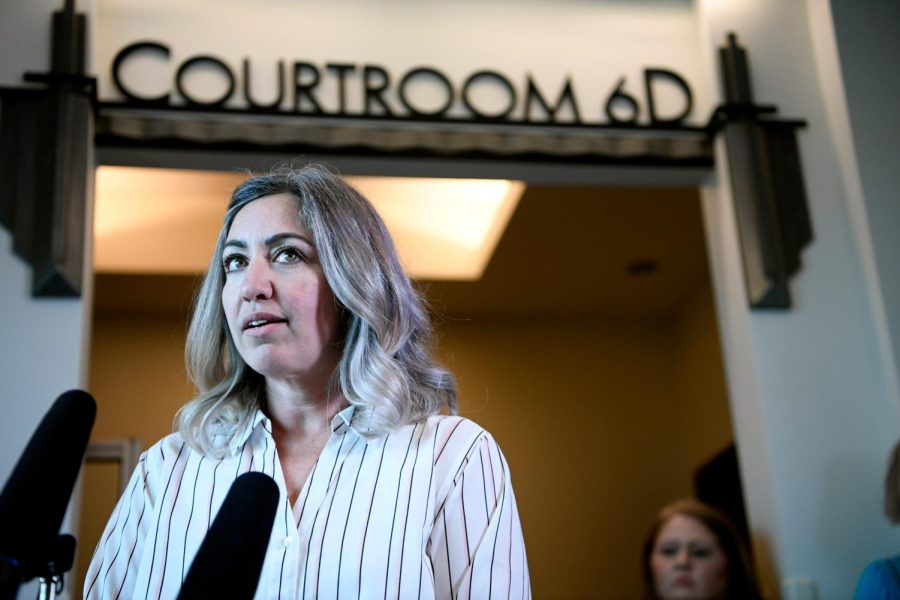Opinion | Punitive systems won’t prevent medical errors
Following RaDonda Vaught’s conviction related to a medication error, nurses locally and nationwide are responding to how this verdict will affect the medical field.
Nicole Hester / The Tennessean / USA TODAY NETWORK
RaDonda Vaught speaks to members of the press after a verdict was reached in her trial at Justice A. A. Birch Building in Nashville on March 25, 2022. She was convicted of criminally negligent homicide and abuse of an impaired adult after a medication error contributed to the death of a patient in 2017.
April 10, 2022
Editor’s note: Sources in this column were granted anonymity in order to speak freely about their opinions without fear of retaliation.
Nurses around the country are arguing against the recent conviction of a Tennessee nurse related to medical error. Some believe this decision will only make the nursing field more secretive.
On Mar 25, RaDonda Vaught was found guilty of two felony charges. Both charges come from a medication error in which Vaught gave a patient a dose of a paralytic drug instead of a sedative before a routine MRI scan. The patient died as a result.
Vaught’s sentencing hearing is set for May 13. She faces a maximum prison sentence of 12 years.
This case is not going unnoticed in the Iowa City nursing community.
“When punitive systems exist for error reporting — less errors are reported. When less errors are reported, we prevent important opportunities to develop systems that can prevent future errors and when we prevent opportunities to prevent errors, health care is less safe for everyone,” one University of Iowa faculty member said.
Vaught is by far not the only medical professional to have accidentally caused the death of a patient. A Johns Hopkins study estimated more than 250,000 Americans die from medical errors annually.
The study defines medical error as “death due to 1) an error in judgment, skill, or coordination of care, 2) a diagnostic error, 3) a system defect resulting in the death or a failure to rescue a patient from death, or 4) a preventable adverse event.”
That study, conducted before the COVID-19 pandemic, concluded that medical errors were the third leading cause of death in the U.S., though the Centers for Disease Control and Prevention do not group medical errors together. Now, that estimate would put medical errors as the fourth leading cause of death in the United States, falling between COVID-19 and accidental deaths, with 350,831 and 200,955 annual deaths respectively.
While medical errors are not rare, it is unusual that a health care worker faces criminal charges for an error. Vaught’s employer, Vanderbilt University Medical Center, has not faced any criminal charges for the error.
A second-year UI nursing major said coworkers and peers have been voicing concerns about what this case says about workplace protections for nurses.
In response to how she felt about the Vaught decision, the student said medical professionals are also human.
“All jobs are susceptible to human error. We have the ability to do great things in the medical field, but there is always a risk that a course of treatment will not go as planned,” she said.
Since the start of the coronavirus pandemic in 2020, hospitals around the country have been experiencing nursing shortages. Even so, nurses are quitting their jobs in an act of solidarity for Vaught. At the end of 2021, University of Iowa Health Care was struggling to hire for all open medical personnel positions – including nurses – due to rising daily workloads and burnout.
When asked what she saw as contributing to the rate of medical error related deaths, the same UI student said the answers lie within the medical system rather than a singular hospital or professional.
“Nurses often have low control over treatment plans and are overworked to the point of fatigue. This is all while trying to provide the best care they can,” they said. “When nurses report their mistakes, hospitals around the country have shown a pattern of blaming the individual rather than taking accountability for how the work environment contributes to mistakes like Vaught’s.
Columns reflect the opinions of the authors and are not necessarily those of the Editorial Board, The Daily Iowan, or other organizations in which the author may be involved.



